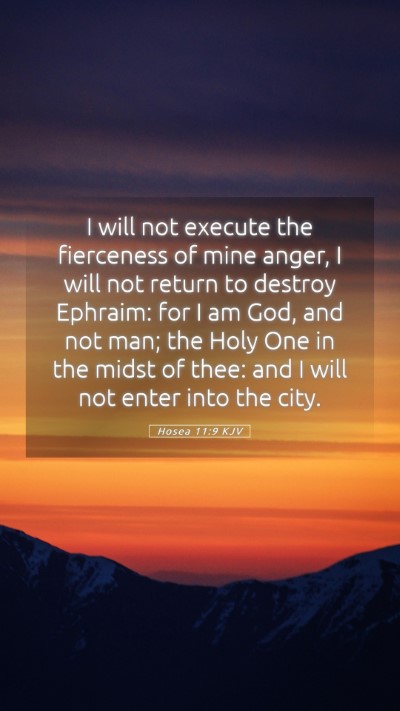Old Testament
Genesis Exodus Leviticus Numbers Deuteronomy Joshua Judges Ruth 1 Samuel 2 Samuel 1 Kings 2 Kings 1 Chronicles 2 Chronicles Ezra Nehemiah Esther Job Psalms Proverbs Ecclesiastes Song of Solomon Isaiah Jeremiah Lamentations Ezekiel Daniel Hosea Joel Amos Obadiah Jonah Micah Nahum Habakkuk Zephaniah Haggai Zechariah MalachiHosea 11:9 Meaning
What is the meaning of Hosea 11:9?
I will not execute the fierceness of mine anger, I will not return to destroy Ephraim: for I am God, and not man; the Holy One in the midst of thee: and I will not enter into the city.
Hosea 11:9 Bible Verse Meaning
Bible Verse Commentary on Hosea 11:9
Verse: "I will not execute the fierceness of my anger; I will not return to destroy Ephraim: for I am God, and not man; the Holy One in the midst of thee: and I will not come in fury." (Hosea 11:9)
Meaning of Hosea 11:9
This verse reveals God's profound mercy and grace towards His people, particularly the northern kingdom of Israel, represented by Ephraim. Despite their rebellion and sinfulness, God chooses to hold back His judgment, highlighting His divine nature in contrast to human impulsiveness.
Bible Verse Interpretations
According to Matthew Henry's Commentary, this verse serves as a tender reminder of God's unchanging character. Despite the harsh penalties deserved by the unfaithful nation, God's love prevails, nurturing the relationship with His people rather than resorting to total destruction.
Albert Barnes expands on the idea that God's refusal to demonstrate fierce anger showcases His patience. He notes that God’s divine nature signifies a commitment to redemption rather than retribution. Instead of addressing Israel’s sins with immediate judgment, God expresses a longing for their repentance.
Adam Clarke emphasizes that God's identity as "the Holy One" underscores His moral purity. His mercy accordingly does not condone sin but rather seeks to lead His people toward righteousness. Clarke also points out the significance of God's presence among His people, implying that His holiness and grace coexist to guide them toward salvation.
Scripture Analysis
This verse invites in-depth Bible verse analysis through its examination of God's emotional state. The imagery of God as not being 'man' highlights His transcendent nature, providing comfort in knowing His judgments are guided by wisdom rather than human emotion.
- God’s Anger: God's anger is real and justified, yet it is tempered by His loving kindness and desire for reconciliation.
- Divine vs. Human Nature: The verse starkly contrasts the often flawed and reactive nature of humans with that of God, who is infinitely wise and understanding.
- Presence Among His People: God affirms that He is "in the midst of thee," signifying His active involvement and care in the lives of His people.
Understanding Scripture
For those engaged in Bible study groups or online Bible study, this verse serves as a critical pivot point for discussing themes of grace and judgment. The understanding of God's character facilitates conversations around how to interpret Bible verses in light of His nature.
- Application of Hosea 11:9: Believers today can learn to reflect God’s mercy in their interactions with others, choosing grace over anger.
- Historical Context: This passage must be viewed within the context of Israel's history, where civil and spiritual disobedience prompted calls for repentance.
- Relating to Other Verses: In looking for the significance of Hosea 11:9, one may explore parallel themes in other scriptural texts.
Related Bible Cross References
- Isaiah 54:7-8: God's everlasting kindness and mercies for His people.
- Micah 7:18-19: God's forgiveness and compassion contrasted with human sinfulness.
- Romans 9:15: God’s sovereign choice in showing mercy to whom He wills.
Conclusion
The verse Hosea 11:9 holds deep significance as it encapsulates God's divine forgiveness and emotional commitment to His people. Anyone engaged in Bible study can find in this verse a source of encouragement about God's endless potential for restoration and love, even amidst failure and sin.
Further Study and Resources
For those wishing to explore more regarding this topic, various Bible study guides and resources can elucidate the implications of God's nature in contrast to humanity. These tools can aid in the broader understanding of difficult Bible passages and enhance one's ability to apply scripture to daily life.


